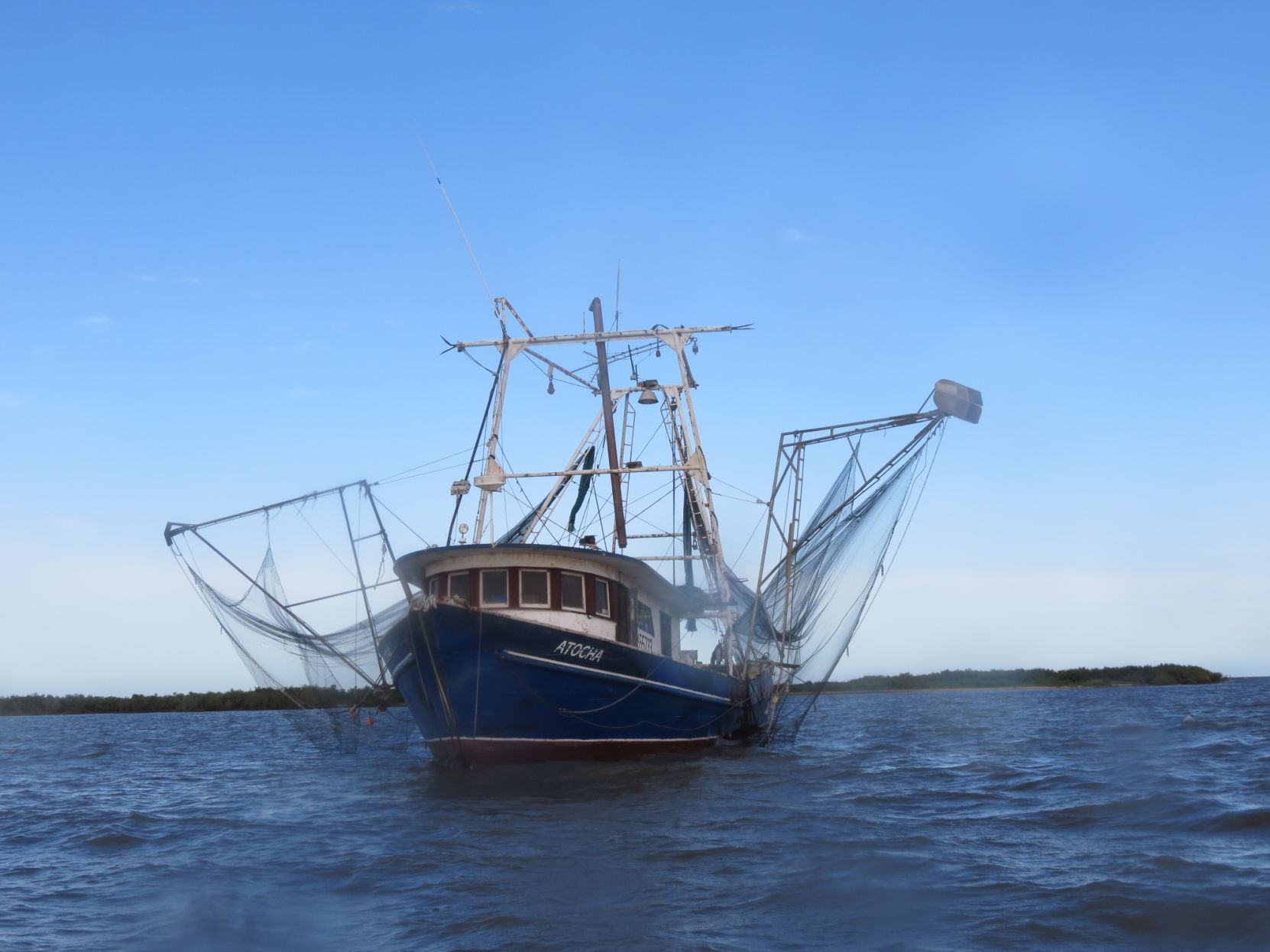
Waste site suit alleges conflict
April 3, 2019Larpenter served Terrebonne well
April 3, 2019Shrimp boats large and small – along with other craft – will ply the waters of some local bayous this weekend, seeking sacred protection as they prepare for a new season that will start next month.
Pennants, posters and priests on the prows of lead vessels at annual boat parades in Chauvin and Dulac are the outward signs of inward faith local shrimping families will profess, as they receive blessings on themselves, their vessels and equipment.
But behind the scenes, perhaps now more effectively than ever before, movement in government circles close to home and far away in the nation’s capital is providing new hope for an industry on the ropes for decades, a victim of U.S. trade practices and government inefficiency.
The focus this weekend, however, will be on the positive when boats begin moving south om Bayou Petit Caillou in Chauvin, where the boat blessing begins on La. 56 across from St, Joseph’s Roman Catholic Church, and in Dulac on La. 57 across from Holy Family Church. Both events are scheduled for Sunday.
Once largely ignored but now moving more prominently onto the government radar screen, the U.S. shrimp industry is cutting a higher profile, its complaints gaining greater attention and in some cases direct action.
· A new state bill filed by a local legislature would require restaurants to state their use of overseas shrimp on menus.
· At the start of this year, shrimp imports became covered under the U.S. Seafood Import Monitoring Program, which helps the government more effectively address cases where banned antibiotics, slave labor and environmental regulations place another nation’s product under more watchful eyes and expanded tests.
· Both of Louisiana’s U.S. senators have brought grievances of shrimpers to Washington, focusing greater attention on their concerns.
—
These developments, local shrimpers generally agree, offer proof that their efforts to address import issues are gaining some traction but not enough. In addition to the economic issues related to global trade, more traditional problems faced by fishermen for millennia also come into account. Temperature and tide have strong effects on the viability of a shrimp crop.
Of immediate concern to local shrimping families is how weather and other climate issues will affect this year’s crop of shrimp, and whether sizes of shrimp due to those conditions will require later openings of Louisiana’s in-shore season. The Louisiana Wildlife and Fisheries Commission usually sets dates for May for openings of the state’s three shrimping zones. In recent years, scientists who put forth their opinions on when seasons should open have spoken of future early openings because waters are warming up more quickly. This year, however, a strong potential for late openings looms.
Chauvin boat and dock owner Angela Portier said that the state’s shrimp task force, at its most recent meeting, was told that cold waters pouring into the Gulf region from the Mississippi River and the ecosystems that feed into it may be keeping shrimp small for the time being.
“They told us they tested last week and the average size was 136-count,” she said, referring to a presentation made by state biologists. A count of 136 means test trawls retrieved shrimp numbering about 136 to the pound, too small for an early season opening, at least for now. While Portier and others in the industry are happy to receive support from elected officials, they also say the economic pressures have not abated.
“We are definitely not seeing benefits,” Portier said. “Prices have never changed and factories say sales are stagnant.”
Nonetheless there appears to be more discussion than in the past in public forums of problems shrimpers have long pointed to as contrary to their interests.
Shrimpers have for nearly 20 years been waging a battle against unfair trade practices that push dockside prices so low fishermen have difficulty making a profit. But recently their woes have been echoing in the halls of Congress.
Last month Sen. Bill Cassidy R-La raised shrimp questions to the U.S. Trade Representative, Robert Lighthizer, during a hearing on tariffs and trade.
While the focus of unfair trade complaints has largely been on nations such as Thailand and China, Cassidy brought up a different competitor, India.
The European Union has placed tough restrictions on Indian shrimp imports, largely due to sanitary issues and the use of antibiotics that the EU has banned. Cassidy said that has resulted in Indian shrimp being dumped into American markets, further harming the domestic industry.
“Now if it was fair trade, that would be fine, but they subsidize it, as you know, they subsidize their aquaculture, and so that subsidy with the restrictions ends up disadvantaging our folks disproportionately,” Cassidy said of India. “I will note, if EU finds their shrimp unsanitary, I’m a little reluctant to have that shrimp in our state for health reasons.”
Cassidy pointed out that India’s status as a nation enjoying trade preferences under a U.S. program has ended, asking if that should not mean the U.S. can pursue tariffs or other restrictions on its shrimp.
Lighthizer responded by noting the trade laws that allow U.S. industries to sue for tariffs where injury can be proven along with other requirements.
On the sanitary issue, Lighthizer expressed a willingness to discuss that matter with the Department of Agriculture. Once considered a mask for protectionism by industry critics, the health issues concerning shrimp raised in overseas aquaculture operations have gained more mainstream status. Among the concerns expressed by health advocates is the potential that over-use of antibiotics in imported shrimp can contribute to the prevalence of anti-biotic resistant germs. It’s something shrimpers have banged the drum about over more than two decades, when the issue was first raised in Louisiana by the late A.J. Fabre, a Lafitte shrimper who was a founding member of the Louisiana Shrimp Association.
Trade actions were brought against imports from nations accused of dumping their shrimp into the U.S. illegally, killing all potential competition in terms of price by domestic industry. The Southern Shrimp Alliance, representing shrimping interests in Texas, Louisiana, Mississippi, Alabama, Florida, Georgia and the Carolinas, was credited with pushing the 2004 trade action that got the ball rolling, funded by dollars from processors and the shrimpers themselves.
SSA spokeswoman Deborah Long said that progress is evident in some sectors of government. In January shrimp imports were officially folded into the U.S. Seafood Import Monitoring Program, the result of hard lobbying by SSA and local shrimpers.
“Three years ago, the United States government recognized shrimp imports to be ‘at risk’ for illegal, unreported, and unregulated fishing and seafood fraud, placing imported shrimp on a list of species to inform the development of a traceability program to be implemented regarding seafood sold in the U.S. market,” Long said. “There was a failed lawsuit by the National Fisheries Institute, representing seafood importers, to prevent the law from going into effect. Domestic importers and large lobbying interests like the National Restaurant Association, had a stay imposed on the implementation of the law with regards to shrimp and albacore. The rejection from the traceability program left a gap in effectiveness, as shrimp is our nation’s largest seafood import with over $6 billion in shrimp products imported in 2017.”
Now that has changed, and shrimpers can monitor the program to see if it makes a bottom-line difference.
Long and other industry advocates said the dialogue between Cassidy and the U.S. Trade Rep was significant as regards India.
“India is going to be a big focus because it is such a major player in the market,” Long said. The EU audits India for antibiotics, she noted, and the nation continually has problems.
At the state level, State Rep. Truck Gisclair’s HB 335, if passed, will create a new law titled RS 40:5.5.4 which will require food establishments in Louisiana that serve crawfish or shrimp which originate outside the U.S. to inform patrons. The Louisiana Department of Health would enforce the law, which will require restaurants and other establishments to provide shrimp and crawfish origin information on their menus, or if they don’t have menus to have the information conspicuously posted.
The law is based in part on Louisiana’s 2009 official recognition of health issues posed by antibiotic use in shrimp and crawfish.
“This state recognizes that serious risks to public health may be posed by antibiotics, radiation and numerous toxins found in seafood products … that originate outside the United States,” the legislative act recognizing the dangers reads. “It remains the intent of the legislature to protect Louisiana consumers from potentially harmful chemicals and residues that are imported from foreign countries … Therefore the legislature declares that Louisiana consumers have the right to know if crawfish or shrimp imported from a foreign country is being served.”
Gisclair said the gist of his bill is simple and straightforward.
“It’s getting to the point we are going to address this antibiotic problem in America and the confusion of people sitting in a south Louisiana restaurant expecting fresh Gulf of Mexico seafood,” Gisclair said. “All we are trying to do is let the people know what they are putting in their bodies, whether it is domestic or it is coming from somewhere else. If I am eating crawfish etoufee it is either from Louisiana or it is important and I will know what I need to know before I order, to have it straight.”
Assigned to the legislature’s health and welfare committee, Gisclair’s bill could draw serious opposition. The Louisiana Restaurant Association is seen by supporters of Gisclair’s bill as being a potential opponent, though the organization has not yet taken a public stance.
Gisclair said he is aware that some establishments, particularly high-priced restaurants with menus that cost a lot to produce, are not eager to make changes. But he is confident that the issue at hand could push it into passage.
SSA’s Deborah Long said that regardless of what happens in state houses or the nation’s capital, what fishermen are most concerned about it the ability to fish. Various domestic regulations enacted in the 1990s, Long said, increased costs to fishermen, making them especially vulnerable to what she referred to as laissez faire trade policies reduced costs to importers.
“When the shrimp industry found the U.S. market overrun with cheap Chinese shrimp, there were protests, marches and lots of anger,” Long recalled. “There was not a solution.
“Sixteen years later, the ability of shrimp fishermen and processors to organize and act against dumped shrimp imports have fundamentally transformed the U.S. shrimp industry,:” she said, expressing faith in the industry’s future. “By speaking with a unified voice, the industry is shaping the legislation and policies that effect their way of life according to the Southern Shrimp Alliance.”
Last year the SSA advocated for exemption of shrimpers from a new federal permit requirement. Long said another sign of progress is the additional money authorized by congress for the FDA to test foreign shrimp for antibiotics.
“Shrimpers’ problems are not solved and a troubling number of fishermen continue to struggle,” Long said. “But, shrimpers are no longer simply leaves blown around wherever the wind chooses to take them. Instead, they are a bit more like the stars that fill the sky over our offshore trawlers, following their own path.”












